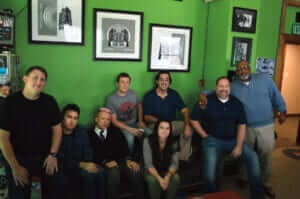Charleston’s volunteer-driven, low-power FM station brings an eclectic mix and local programming to your radio dial.
It’s 8 p.m. on a Saturday, and Seth DiStefano is holed up in a small room on the eighth floor of the Union Building in downtown Charleston. The city below is dark and quiet but, up here, DiStefano likes to play the music loud. If it weren’t for the company in the studio, he would probably be playing air guitar and drum, too.
“I’m so excited,” he says into the microphone. “We are going to play the best band in the universe because you’ve earned it, Charleston. You know how we feel about Tool.”
DiStefano, a lobbyist during the workweek, spends his Saturday nights hosting a two-hour hard rock radio show on 88.1 FM WTSQ, otherwise known as the Status Quo, Charleston’s low-power FM station. It’s a 501(c)3 nonprofit that operates entirely on volunteer manpower and contributions from the community. The station celebrated its second anniversary in July 2017.
Like most of WTSQ’s nearly 60 volunteers, DiStefano didn’t have experience as a radio DJ when he started more than a year ago—just a love for music and a desire to introduce people to the songs that get him pumped. “It’s really fun and fulfilling to be around people who geek out about music the same way that I do,” DiStefano says.
Tuning In
Chris Long, WTSQ’s founder and president, hadn’t worked in radio before the station started, either. Long worked in information technology before transitioning into a career as a registered nurse. A 38-year-old Boone County native, Long was shocked when he moved to Charleston in 2010 and found there wasn’t an alternative radio station. “The stations in town had been playing the same playlists since the ’80s,” Long says. “There wasn’t anyone playing some newer, edgier stuff.”

He completed the application process and, after about a year and a half of waiting, Long got the official OK from the FCC in January 2015. He officially started broadcasting in July 2015.
What you hear on WTSQ depends on when you tune in. The station plays music that ranges from jazz and hip hop to world and traditional folk music. There’s even a late-night talk show about sex and relationships.
Weekdays begin with the independent news program “Democracy Now.” A Sunday afternoon show, “Mountain State Update,” features a local news discussion. The station is hyper-focused on Charleston, and for good reason. At 100 watts, its signal only reaches between five and 10 miles from the downtown broadcasting tower.
The station often has a presence at events throughout the city, like the monthly Downtown Charleston ArtWalk, the Live on the Levee concert series, and Downtown Streetfest.
And even when WTSQ volunteers aren’t there, they’re promoting local organizations and events on the airwaves.
“There’s a lot going on in the city that’s very hip and cool,” Long says. “We want to be that outlet that really focuses on that. Because, unfortunately, commercial radio—regardless of community— the nature of the beast is not focused necessarily in the city that they reside in.”
Long sees WTSQ as a community service organization that happens be a radio station. “It’s about bringing people from other nonprofits and organizations and events on the air and highlighting them and showcasing what incredible things we have here in Charleston.”
He says focusing on the good things going on in Charleston counteracts the negative attitude some of residents are prone to have. “Charleston can be a little too hard on itself and I don’t get that,” Long says. “I guess I kind of got that before getting into the streets with volunteers. The engagement has made me aware how vibrant the community is.”
Cool Kids, Common People
Matt Murphy was a substitute teacher when he started volunteering at the station in 2016. It was his first gig in radio, but it led to a part-time job at West Virginia Radio Corporation. He now splits his time between the two stations. He hosts a show on WTSQ and does some of the operations work.

“That takes a lot of getting used to,” Murphy says. “To go from being a person on the street to having access that the ‘commoners’ don’t have. And the thing is, we are all just commoners up here. We are not these fancy people that are doing this.”
While the station does a lot to promote the community, it also gets a lot back from it. Contributions from members, underwriting organizations, and merchandise sales keep the station afloat. During the 2017 fall membership drive, enough members signed on to cover WTSQ’s rent at the Union Building. “I really am amazed at this community’s response to this entire endeavor,” Long says.
In addition to his full-time job as a registered nurse, Long puts in 15 to 20 hours during an average week in behind-the-scenes work at the station. He doesn’t have a show. “I work in a field where I literally resuscitate people, and this is what I find rewarding,” Long said. “I know it comes across as a funny thing to say. But you’ll find that similar sentiment amongst the DJs, amongst the volunteers.
“This gives my life a lot of value and a lot of purpose.”
written by LORI KERSEY
photographed by ZACK HAROLD










Leave a Reply